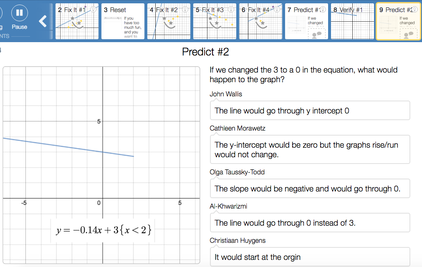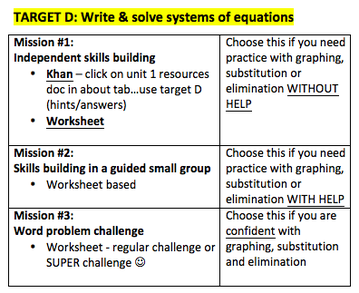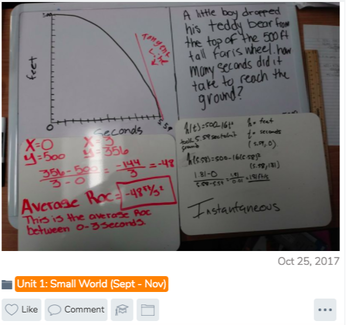From Good to Great
For as long as I can remember, I have been interested in helping people. It’s no surprise then that I enjoy teaching and that I’m constantly looking for ways to go “good to great” with all that I do. “Good to great” is a phrase my principal uses a lot and I love it! What this means to me is that I’m always revising what I do and looking to improve. Overall, I hope to increase student learning and help my students become confident, independent and empowered students and individuals. I think high school math classes sometimes get a bad reputation and want to change the way my students learn and view math. My goals going forward to improve my math teaching are to look into using technology effectively in my math classes, differentiation in my classroom and alternate forms of assessment. My resource collection has links to resources I’m collecting from online research to continue my learning aligned to these goals. I plan to keep this as an ongoing source of information and inspiration for myself, as well as my math colleagues.
Using Technology to Teach Math
 A sample teacher screen from the Desmos Marbleslides linear function activity I used.
A sample teacher screen from the Desmos Marbleslides linear function activity I used.
Technology can improve how I teach math, whether it involves students exploring, creating or sharing their knowledge. I am excited to look into this more, even though I have already started using resources that I have found online. I have a couple of favorite websites for math exploration that have hundreds of pre-made exploration activities for students (Desmos and Geogebra), formative assessment (Quizlet, Kahoot and Socrative) and students sharing their work (Seesaw and Google Classroom), but I feel like there are more resources to look into and more ways to use these current resources! Additionally, I want to keep in mind the balance between 'high tech' (internet and devices) and 'low tech' (manipulatives, paper, pencil, etc.) resources and recognize that sometimes one type of technology is more appropriate than the other. Therefore, my goal is to continue exploring math resources that improve teaching and learning, especially considering how I could share these resources with math teachers who are new to teaching and/or using technology in their classroom. For more technology resources that I (or my grad school colleagues) recommend, check out my Ed Tech Toolkit!
Differentiation
 My guide to a differentiation
"choose your own mission"
day in advanced algebra class
My guide to a differentiation
"choose your own mission"
day in advanced algebra class
Differentiation is another of my goals because I want to help each of my students learn and that is difficult with whole class instruction and the same tasks for each student. The way that I give and score quizzes is similar to standards based grading, so I can track where each student is with each of our learning targets. Quite often, there is a large discrepancy in my students’ math abilities so I am currently looking into (and experimenting with) ways to structure class time differently so that all students are supported and challenged appropriately. For example, I try to group students so some have an extension task, some have extra support (re-teaching) from me and others have 'typical' level practice. What I wonder most about this is how and when to do this; too much means I might lose control of the pacing of my students and too little means I might have students bored or frustrated and confused. Additionally, there is often a stigma about being in the 'low' group that needs teacher support, so I want to be mindful of that. Good articles I'm using to make progress on differentiation include an NCTM article and an article from the Access center which outline various grouping and student choice strategies. For the presentation I gave about differentiation, check out my showcase page.
Alternative Forms of Assessment
 Screenshot of one group's "create your own problem" that they posted on Seesaw.
Screenshot of one group's "create your own problem" that they posted on Seesaw.
Once students have learned the material, I am interested in finding out more about how technology can be used (if appropriate) to give students a different platform to demonstrate their understanding of our learning targets. For math, I always give a “paper and pencil” quiz and/or test, and I think that is important to know how well students have mastered given skills. However, I am aware that some students prefer other methods of showing what they know and I am curious whether having alternate forms of assessment would help students better demonstrate their understanding of a topic. I also wonder whether students would be more motivated if they had more choice in their assignments or assessments. Therefore my goal is to build an alternative assessment into each unit, likely used in conjunction with my normal test. A few suggestions can be found from Maneuvering the Middle here, as well as a wealth of performance tasks (formative assessment lessons). This year I had my students create Seesaw accounts so they can share their work with me and the rest of the class.
Good to Great
I have been challenged and inspired during my Master of Arts in Educational Technology; I really want to become an even better teacher and I know that continuing to learn and explore is an important part of that. For me, looking into differentiation, alternate forms of assessment and how to effectively use technology in math will allow me to better support each of my students’ learning needs. I hope in the coming years I can take my teaching from “good to great” and inspire my students to do the same with their learning!
